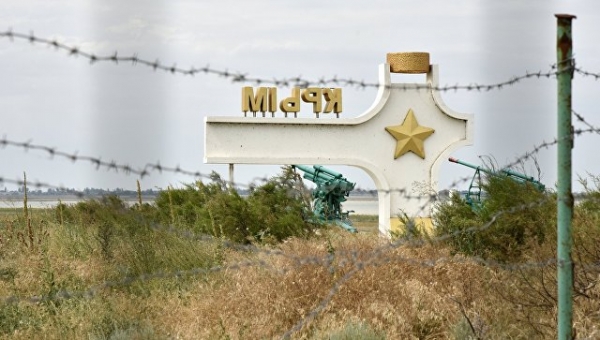
Throughout July 2016, both in Ukraine and in Russia there was a formation of information background for some upcoming decisive political change around coming from the 2014 conflict. In particular, some observers predicted a worsening of relations with Ukraine in August 2016. And the aggravation is followed, but not in the form of the outbreak of hostilities in the Donbass, and provocation in Crimea.
August 10, 2016, two days after the incident, President Vladimir Putin said that Ukraine “has moved to the terror in the Crimea. While the blame for the incident was entrusted to the uncontrolled Ukrainian nationalist radicals, but directly to the Ukrainian state structure in the face of military intelligence of Ukraine. Putin said that the Crimean kurtosis renders meaningless the previous day announced by the Minister of foreign Affairs of the Russian Federation Sergey Lavrov talks at the highest level in the “channel format” on the sidelines of the G20 summit in China in September 2016. In connection with the disaster, Putin appealed to those “who support the current authorities in Kiev”. According to the Russian President, they should, if you really support a peaceful settlement, “to take any real steps in order to exert pressure on the current authorities in Kiev”. In the ensuing the following day the statement of the Russian foreign Ministry also called on “our partners, whose efforts largely retained the power of the current regime in Kiev, to exercise prudence and to achieve, finally, from their Ukrainian wards permanent cessation of provocations and fulfill its obligations in accordance with the Minsk agreements on a political settlement in Ukraine”. “If the Supreme commander of VSU [President Poroshenko] involved in the decisions [of preparing acts of sabotage in the Crimea], he claims the role of the gravedigger of the peace process”, affirmed in a statement the Russian foreign Ministry.
Thus, in the center of the Russian demarche demanded to exert pressure on Kiev to implement the Minsk agreements. It is obvious that, from the point of view of Moscow, the points of the Minsk agreements of February 2015 must be executed in the order in which they appear in the text of the Treaty, taking into account subsequent in October 2015 modifications in the question of priority of elections before the constitutional changes. The last item is the maximum of concessions until Moscow agreed. But the fact of progress inspired the Kiev and our partners ‘ confidence to demand more concessions from the Kremlin. The new clause was the requirement for the introduction of international peacekeepers in the conflict zone.
In response to a specific demarche of the Kremlin on 10 and 11 August 2016 with the requirement to put pressure on Kiev to implement the Minsk agreements have not followed the less specific response of the West. Performing in Kiev, the role of “proconsul” US Ambassador Geoffrey Pyatt said: “the U.S. Government has not seen any evidence of Russian accusations in the invasion of Crimea, which Ukraine confidently denies”. Payette noted that this is not the first false accusation of Ukraine, expressed to divert attention from their own illegal actions.” He confirmed that the United States will extend the sanctions against the Russian Federation related to the “occupation” until such time as the country will not return Crimea to Ukraine. “We condemn and call for an immediate end to the Russian occupation of the Crimea”, — said Payette. “Crimea is and will always remain part of Ukraine”, — said the Ambassador of the United States.
The U.S. state Department spokesman Elizabeth Trudeau also said that the statements of Russia about the alleged involvement of Ukraine to “terrorism” in the Crimea should not distract from the real problem, which was created by the Russian Federation in Ukraine — “occupation of Crimea and aggression in the East of the country.” Thus, the U.S. bypassed the question of Kyiv Minsk agreements and focused in their replies on the occasion which was considered non-existent. Moreover, Moscow is almost directly pointed to the fact that the hybrid nature of the ongoing war does not imply the validity of claims of Russia on the Crimean incident. In describing the problem of conflict Crimea was tied to events in Eastern Ukraine.
In the headquarters of NATO, in turn, said that Russia did not provide hard evidence of their accusations against Kiev. “We are pleased with the strong condemnation of Ukraine of terrorism in all its manifestations and forms,” — said in Brussels. NATO believe that Russia’s military activities in Crimea is not helping to ease tensions and called on Russia to cease its “illegal and illegitimate annexation of the Crimea”.
The German foreign Ministry called the alarming the situation with the deterioration of relations between Moscow and Kiev and urged both parties — Russia and Ukraine to avoid steps that could worsen it. Thus, the German position different from the position of the United States only equal distribution of responsibility for the escalation of the conflict. But Berlin outwardly ignored and the occasion, and the Russian requirement of the Minsk agreements.
Despite repeatedly expressed concerns in the media about the current escalation in the West seriously believe in the willingness of Moscow to the military offensive in Ukraine. They do not believe that the Kremlin will use the Crimean incident as a casus belli. “Taking into account its economic problems, Moscow is trying to distance themselves from the fighting in the Ukraine in the hope that sanctions will be lifted”, — summed up a detailed article about the latest escalation of Russian-Ukrainian relations in the American edition of the New York Times.
In the end, the Russian requirements of Minsk was publicly ignored, and the Crimean incident of Kiev became a good opportunity to test the West’s reaction to the case of aggravation of the conflict. In a situation provoked by the US and the EU reaffirmed their full political support to Ukraine. The vast majority of the Western media expressed skepticism about the Russian version of the Crimean events. The Ukrainian leadership is just mocked by Moscow. Moreover, it became clear that the possibility of sabotage in the Crimea, especially if they will be against the Russian military and transport infrastructure, will not find condemnation in the West. Moreover, they will be interpreted as acts of resistance against the “Russian occupation” of Crimea. Note that in the impending provocations Kiev was trying to falsely present to the world the current Crimean Tatar factor. The information for this turn, the West was ready after a flood of false reports about the mass repressions against the Crimean Tatars in the Crimea.
Departing from the particular case, we can say that any action of Russia against any provocative actions of Kiev will be considered in the information field of the West as the preparation of aggression or even as an act of aggression. Hostile actions of Kiev, which he will deny, will be simply ignored by the West. This attitude, in turn, provokes Kyiv on new provocations, on the continuation of the conflict and its aggravation.
However, the connection attempt by Kiev problems of the Crimea have not yet changed the General scheme of settlement of the conflict through the Minsk agreements. Externally, the Minsk process has avoided any changes, and the West did not respond to the attempt of Kiev to bring to the fore the problem of the Crimea. However, the Crimean incident confirmed previously proposed in Russia fear that the resolution of the conflict in the Ukraine does not address the issue one only of Donbass. After the date the DNI and LC West raised the issue of Crimea.
The other reality. Obviously, the recent Crimean incident was directly linked to the impasse of the Minsk agreements. The United States, which in the face of the current presidential administration needed at least some progress in the implementation of the Minsk agreements to completion of the administration of Barack Obama and the forthcoming presidential elections, drove the Ukrainian leadership into a trap. On the one hand, in the name promoted by the United States and the EU high purposes of the reforms, the Ukrainian authorities have dramatically raised utility bills for the population. On the other — the West in the face of the IMF slowed down, at least until September, giving Kiev the next tranche of $ 1 billion because of the position of the nationalist radicals and inter-party struggle in Parliament, President Poroshenko was not able to move what little of the Minsk agreements that was required of him by the state Department from Washington. In this situation, the conventional “war party” in Kiev tried by means of provocations in Crimea to drop in General, Minsk agreement, write it off to Russia. In Kiev described the situation in systematic preparations for the aggravation of the situation and the disruption of the Minsk agreements. Relatively speaking, the Kiev radicals in the government began to advance to play into the hands of the next more militant presidential administration of the USA.
The main problem of the current August to the deterioration of relations with Ukraine is the fate of the Minsk agreements. In the final case of their failure it is necessary to determine the guilty party, since the issue revolves around sanctions, their possible partial withdrawal or renewal. Recall that at the end of last year, the implementation of the Minsk agreements has been extended until the end of 2016. The question of sanctions in the EU will decide at the end of this year, just after three months. Now at the end of summer it becomes clear that the Minsk agreement will not be fulfilled this year. Moreover, the escalation in the Donbas and provocation in Crimea demonstrates that through the Minsk agreements failed neither to freeze the conflict in the Donbas or create a two-part scheme with the removal of Crimea in parentheses General conflict of Ukraine with Russia.
The Western media has already voiced regret that Moscow was not willing to participate in the negotiation process. However, recent statements of the Russian leadership cannot be regarded as a way out of the Minsk process. Although the Minsk agreement is dead, long live the Minsk agreement!
The question arises: if not the Minsk agreement, then what instead? As an alternative they started sounding offer of a new agreement called the Minsk-3, the key point which should be the introduction of international peacekeepers to the Donbass. With the last sentence I agree that part of the Russian expert community, which focuses on the reduction of geopolitical tensions in Russia’s relations with the West. However, in this part such a proposal raises concerns that the introduction of “international peacekeepers” in the line of military demarcation in the Donbass do not lead to the freezing of the conflict or its resolution. If after such actions the Ukrainian side refuses to fulfill the main part of the Minsk agreements and uses the presence of “international peacekeepers” as a tool of new military provocations? After all, the entire previous year Kiev has demonstrated a fundamental inability of.
As demonstrated by recent events in Crimea, the set of possible actions of the Kiev government in the field of provocation and obstruction can be very broad. The Crimean incident showed Moscow that the conditional compromise to save face will not. Enemies of Russia need a complete political capitulation of its leadership. Yet the recent Crimean incident showed that the US is ready to raise the stakes in the Ukraine conflict. Russia, bound by the Minsk agreements — no.








